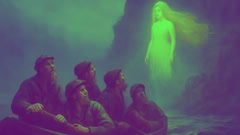Introduction
Where the Rhine River bends and narrows beneath jagged cliffs, the water churns with secrets centuries old. These rocks, polished by time and river’s song, rise like ancient sentinels above the swirling currents. For generations, ferrymen and traders, poets and wanderers, have whispered of a presence that dwells atop the highest of these crags: a woman whose beauty is rivaled only by her sorrow, whose song weaves through the evening mist, ensnaring the hearts—and fates—of all who hear it. This is the legend of Lorelei, the siren of the Rhine, whose name is spoken with awe and caution in every riverside hamlet. Her story is etched into the very landscape, a tapestry of longing and mystery, where sunlight plays on the water and shadows slip quietly through the pines. Some say Lorelei is a spirit of vengeance; others, an immortal yearning for lost love. All agree on one thing: those who hear her song are forever changed, marked by beauty and tragedy in equal measure. To approach the Lorelei Rock as dusk settles is to risk more than one’s life—it is to risk one's soul. Yet, drawn by curiosity and the eternal pull of the unknown, many have sought her—and not all have returned to tell the tale. What is it about the Lorelei that binds the heart so tightly? Is it her haunting melody, echoing off stone and water? Is it the shimmering gold of her hair in the last rays of sun, or the depths of her sorrow, mirrored in the river’s restless tide? In this retelling, we journey back through mists of time to uncover not only the origin of Lorelei’s lament but the timeless power of the river that gave her birth. Through romance, betrayal, and the elemental magic of the Rhine, this is the story of a woman both mortal and myth—of the dangers and wonders that lie where water meets rock, and where longing meets destiny.
The Song of the River: Lorelei's Beginnings
Long before her name was legend, Lorelei was simply a girl born in a riverside village shaded by the ancient forests of the Rhine. She grew up amid fishermen’s nets and the laughter of market days, her days marked by the scent of wild thyme and the distant chime of church bells. Even as a child, Lorelei felt the river’s call—a pull that seemed to echo in her blood. She would slip away to the water’s edge, listening to the lull and rush of the current, learning its moods and rhythms as one learns a lover’s heart. Her voice, when she sang, carried across fields and water, as pure as the dawn mist. It was said that songbirds fell silent to listen and that the old would pause in their chores, momentarily young again under the spell of her melody.

Lorelei’s beauty became the subject of many tales in the village: her hair, a cascade of sunlit gold; her eyes, green as river moss; her laughter, bright as spring rain. Suitors from up and down the Rhine sought her hand, yet she seemed untouched by their advances, her heart bound to something vaster than any one man could offer. Some whispered she was a child of the river itself, a spirit in human guise. Others watched with envy as she wandered, barefoot and free, on the mossy banks.
As she grew, so too did the shadow that crept along the river’s edge. It began with restless dreams—visions of storm-tossed waters and voices singing in a tongue older than stone. Lorelei’s song changed; it became more haunting, threaded with longing. The villagers grew uneasy, sensing that something had shifted. When a traveling knight, Sir Konrad, arrived one summer, everything changed. He was noble, handsome, and lonely—a man marked by grief. He heard Lorelei’s voice drifting through the trees one evening and followed it to the riverbank, where he found her wreathed in moonlight. Their eyes met, and in that moment, two destinies entwined.
Lorelei and Konrad spent days wandering the woods and nights talking beneath stars. The village buzzed with gossip, but Lorelei’s heart felt alive for the first time. Yet Konrad harbored secrets of his own—wounds from battles lost, burdens too heavy for one soul. Their happiness was brief. One evening, as a thunderstorm swept in, Konrad confessed his fear that he could never stay; his duty called him away. Lorelei, desperate not to lose him, sang a song more powerful than she’d ever dared. The winds stilled. The river’s roar softened. For a heartbeat, time itself seemed to wait.
But the river is not a thing to be tamed. Konrad, transfixed by the song, moved closer to the edge where the current swirled black and deep. In a moment of confusion and longing, he slipped, falling into the churning water below. Lorelei screamed his name, but the river claimed him without mercy. When the storm cleared, he was gone, and Lorelei’s heart shattered.
Her grief was so profound that the villagers turned away in fear, whispering that she was cursed. Some claimed she’d summoned the storm herself. Alone, Lorelei climbed the highest rock above the Rhine and sang her sorrow to the night sky. It’s said that the river answered—rising in mist and wind, swirling around her until her form dissolved into legend. From that day on, travelers spoke of a woman atop the rocks, her song a beacon and a warning, her fate forever bound to the restless river below.
Enchantment and Danger: The Siren's Lure
With Lorelei’s transformation, the rock above the Rhine became a place both feared and revered. No longer did children dare to play near its base, and fishermen crossed themselves when passing beneath its shadow. Yet, the river was a lifeline—trade, travel, and the pulse of daily life depended on its waters. And so, despite whispered warnings, boats continued to ply the stretch below Lorelei’s rock, drawn by necessity and, at times, an irresistible curiosity about the song that now drifted with the mists.

Sailors from distant towns brought tales to every riverside inn: of a figure glimpsed in the gloaming, her golden hair shining like a beacon, her song as sweet and piercing as crystal. Some said it promised eternal love, others that it mourned for all that could never be. Men who heard her music felt a longing so deep it seemed to erase memory, duty, even fear itself. More than a few ships foundered on hidden rocks in the current’s swift embrace, and those who survived spoke of Lorelei’s eyes—green and unblinking—watching from above as the river took its due.
The legend grew with every retelling. Some described Lorelei as vengeful, a spirit luring men to their doom in retribution for her own heartbreak. Others swore she was a guardian, warning away those who would challenge the river’s might. Poets wrote verses of her beauty; musicians tried, and failed, to capture her melody. Yet none could explain the strange peace that sometimes fell over the river at dawn, when mists curled around the rocks and a faint song lingered in the air, promising both hope and despair.
As years passed, Lorelei’s story reached beyond her village. Knights, adventurers, and would-be heroes came seeking her—some for love, some for glory, some simply for proof that legend could touch reality. Among them was Wilhelm, a young composer from Mainz. Obsessed with the idea of bottling her song, he set out on a fog-drenched morning with only his lute and an aching heart. When his boat drew close to Lorelei’s rock, he saw her—a vision in shimmering white, her face both familiar and unknowable. She sang, and Wilhelm’s hands fell from his instrument; tears rolled down his cheeks as he understood that some beauty cannot be captured or possessed. His boat drifted past, untouched by disaster, but he never played again. Instead, he dedicated his life to telling others what he had seen and heard: that Lorelei’s song was not just a warning or a trap but a lament—a yearning for connection, for understanding, for peace she could never claim.
Over time, the legend softened. Villagers left offerings of wildflowers on the rocks each spring, and travelers who listened with respect found safe passage. Lorelei’s presence became a symbol—a reminder that nature is both breathtaking and dangerous, that love can uplift and destroy, and that some mysteries are meant to be honored, not solved. The Rhine continued its endless journey to the sea, and atop her lonely rock, Lorelei kept watch, her song echoing through time, undiminished.
Conclusion
The legend of Lorelei endures—not merely as a cautionary tale for river travelers but as an eternal meditation on longing, nature’s power, and the boundaries between myth and memory. Her song still drifts on moonlit nights, mingling with the sighing wind and ripple of water over stone. Visitors to the Rhine’s cliffs pause in silent awe, drawn by something ancient and unspoken: a yearning for beauty that defies explanation, for stories that never quite end. The villagers say that when the river runs high and restless, Lorelei’s voice rises to meet it, bridging worlds with her melody. Her story is part of the Rhine now—woven into every eddy and shadow, a reminder that loss and wonder often share the same shore. To listen for Lorelei is to listen for all that is wild and fragile in ourselves; to honor her legend is to honor the river, the heart, and the mysteries we carry with us always.













